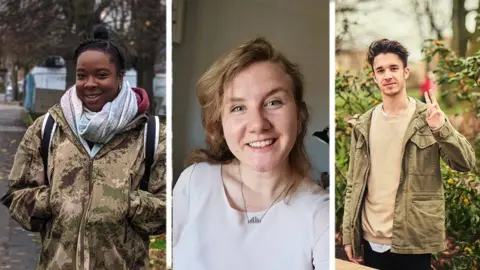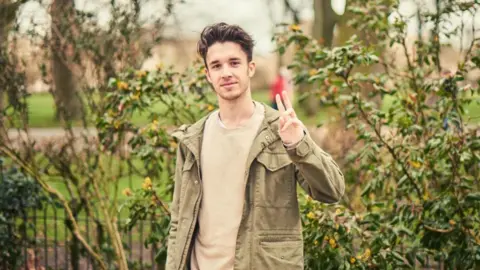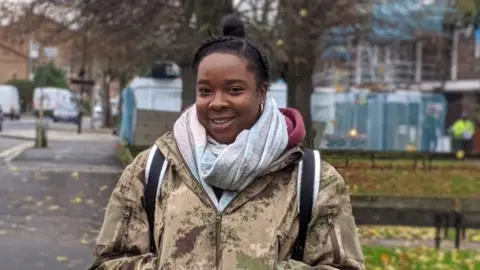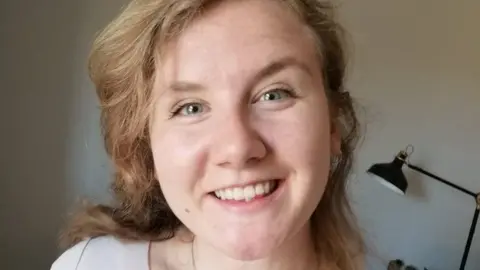Coronavirus: How lockdown has affected my money
 Beam/Abigail Banfield/Stew Capper
Beam/Abigail Banfield/Stew Capper"I bought loads of junk that I wouldn't normally get."
Mikey Burton has spent more than a thousand pounds on items to get him through lockdown.
"Not being able to go out and do anything ... I needed to fill my time," the 25-year-old tells Radio 1 Newsbeat.
Being trapped inside turned out to be the perfect opportunity to make home life a bit more comfortable.
"It definitely wasn't the saving opportunity I thought it would be," he adds.
 Stew Capper
Stew CapperUntil last week, Mikey was on furlough - that's when you're not working but are kept on your employer's payroll - from his job in marketing.
"At the start, I tried and failed at a couple of hobbies like painting or building a guitar pedal."
And that's when he decided to splurge on things he wouldn't normally get.
"A bike, loads of plants which turned my flat into a jungle, arty posters, video games, music records and even bed sheets."
Mikey's "definitely not a saver", but he doesn't consider himself to be well-off.
"I don't struggle financially, but there's not a huge amount of money leftover," he says.
He doesn't think he'll continue spending at the same level once life is back to normal.
"We can start to see the light at the end of the tunnel and I'm starting to realise that I need to shape up a bit."
But that doesn't mean he has major regrets.
"I don't think I would change a huge amount about what I've bought. Maybe a few less takeaways."
'It's been a struggle'
Not everyone is able to spend money on making life comfortable during lockdown.
For some, like single mum Sharell Thomas, it's been a challenge just to get essentials - as she's losing £150 per month.
"Food, clothes, gas and electric, that's my main concern."
Sharell, 27, has been in temporary accommodation for three years with her nine-year-old daughter - and is currently on furlough.
"Before lockdown I was still getting 100% wage and universal credit. Being on furlough with it now 80% is not as much."
As a result, she's cut back on things like extra food, and books for her daughter to read.
 Beam
BeamShe can't attend school, so Sharell has "had to buy toys and games to keep her occupied during the day".
While she praises government schemes such as furlough and universal credit, the structure of the furlough scheme has made it "a lot harder" for her to manage money.
"I used to get paid every two weeks, but with furlough, it's at the end of every month. I have to try and budget better," she says.
She's also had to rely on family, friends and platforms like Beam - a group that support homeless people.
It's been a help with things like vouchers for supermarkets, bookshops and transport.
"Without it, life would be a lot harder.
"Even with finding stuff to do with my child that I wouldn't necessarily have been doing while she was at school. It's definitely been a struggle," Sharell adds.
'I've become richer'
For some, lockdown has been a perfect time to save money and - in Abigail Banfield's case - become richer.
Abigail's been working from home, and saved around £200 a month on travel, which she's used to invest in stocks.
"I took the leap and invested that, so it didn't feel like I'd lose money," the 27-year old tells Newsbeat.
She took advantage of falling market prices - caused by the virus - which meant stocks became more affordable.
"There's no way I would have been able to buy shares in a normal situation. It just became more accessible and paid off for me."
 Abigail Banfield
Abigail BanfieldAbigail and her partner rent a house because they can't afford to buy one yet. She decided to invest because "deposits don't grow on trees".
And it's worked out well for Abi.
"I was in the right place in the right time, the investment has massively grown."
"It's been one of those things where I can get a huge return for something. It's made us richer."
Like Mikey, she thinks she will not completely follow her lockdown spending habits once life is back to normal.
"I'll probably scale back on the investing once lockdown is over. Because I've been using the train fare, so won't be investing as much once I have to go back to the office."
"I feel financially happy. Hopefully, this is the start of being able to buy a house," she adds.


